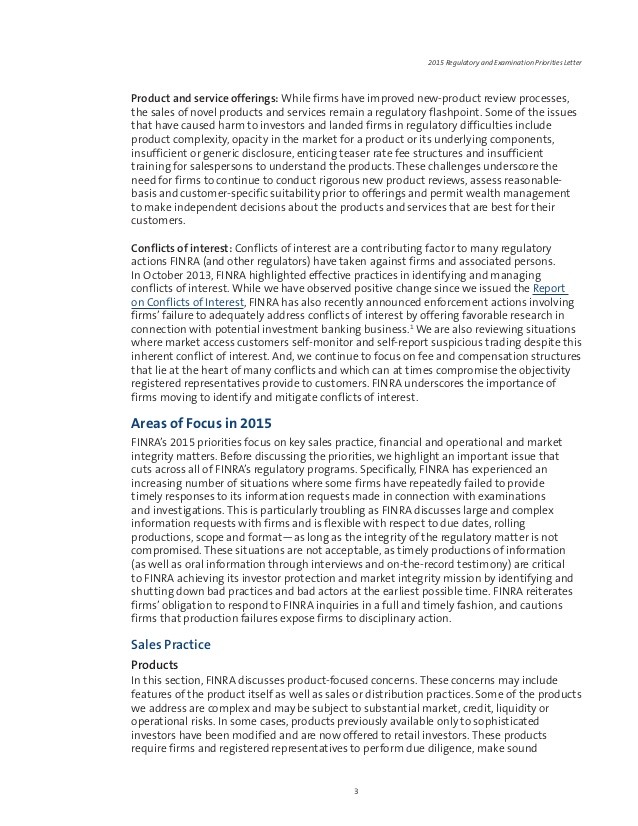2015 FINRA Priorities Letter Released
Post on: 8 Май, 2015 No Comment

On January 6, 2015, FINRA published its tenth annual Regulatory and Examination Priorities Letter to highlight both emerging and existing risks that, if not properly addressed, could adversely affect investors and market integrity in 2015. As noted in the letter, FINRA continues to observe shortcomings in five key areas that compromise firms and registered representatives ability to protect investors and the integrity of the market including the alignment of firm and customer interests; standards of ethical behavior; the development of strong supervisory and risk management systems; the development, marketing and sale of novel products and services; and the management of conflicts of interest.
More specific areas of noted concern are the sale and supervision of interest-rate-sensitive and complex products, controls around the handling of wealth events in investors lives, the management of cyber security risks, and maintaining robust oversight of trading technology and other platforms that interact with markets
FINRA’s 2015 priorities will focus on key sales practice, financial and operational and market integrity matters including the following:
Products – FINRA’s specific product-focused concerns include features of products as well as sales or distribution practices. Some of the products are complex and may be subject to substantial market, credit, liquidity or operational risks. In some cases, products previously available only to sophisticated investors have been modified and are now offered to retail investors. These products require firms and registered representatives to perform due diligence, make sound suitability decisions and describe product risks in a balanced manner that retail investors can understand. With these concerns in mind, FINRA’s 2015 surveillance and examination activities that include product-related risk reviews will routinely focus on due diligence, suitability, disclosure, supervision and training.
Interest Rate-Sensitive Fixed Income Securities – In 2015, FINRA examiners will look for concentrated positions in products that are highly sensitive to interest rates—such as long-duration fixed income securities, high yield bonds, mortgage-backed securities, or bond funds composed of interest rate-sensitive securities—and test for suitability and adequate disclosures. Examiners may also review firms’ efforts to educate registered representatives and customers about such products.
Variable Annuities – FINRA’s focus on sales practice issues with variable annuities—both new purchases and 1035 exchanges—will include assessments of compensation structures that may improperly incent the sale of variable annuities, the suitability of recommendations, statements made by registered representatives about these products and the adequacy of disclosures made about material features of variable annuities. FINRA will particularly focus on the sale and marketing of “L share” annuities as these shares typically have shorter surrender periods, but higher costs.
Alternative Mutual Funds – S ales of alternative mutual funds (“alt funds” or “liquid alts”) have increased rapidly over the past several years, with hundreds of new funds launched and currently available. Alternative mutual funds are often marketed as a way for retail customers to invest in sophisticated, actively-managed hedge fund-like strategies that will perform well in a variety of market environments. Alternative mutual funds generally purport to reduce volatility, increase diversification, and produce non-correlated returns and higher yields compared to traditional long-only equity and fixed-income funds, all while offering daily liquidity. Alternative mutual funds raise concerns when compared to conventional funds. In particular, FINRA is concerned that registered representatives and customers will not understand how the funds will respond to various market conditions or even the strategy in which the fund’s adviser will engage in various market scenarios. In addition, FINRA has learned that some firms are not reviewing alt funds through their new-product review process, especially if the firm already has an existing agreement with the fund company.
Non-Traded Real Estate Investment Trusts (REITs) – FINRA has again identified several concerns with non-traded REITs including general lack of liquidity, high fees and valuation difficulty. These risks remain relevant with respect to customer-specific suitability obligations that firms must perform when recommending non-traded REITs to clients. FINRA also emphasizes that firms should perform due diligence on an ongoing basis on REITs they allow their representatives to recommend. “Red flags” arising from a REIT’s financial statements or management may cause firms to change the types of clients to whom the firm recommends the product or even to discontinue sale of the product.
Exchange-Traded Products (ETPs) Tracking Alternatively Weighted Indices – Indexing has continued to expand beyond traditional market capitalization-weighted methods to alternatively weighted strategies, (e.g., using equally weighted, fundamentally weighted, volatility weighted indices). These indices provide exposure to specific investment risk factors or strategies. Products tracking such indices may be marketed as providing superior risk-adjusted performance relative to products tracking more traditional capitalization-weighted indices. The exchange-traded products market, in particular, has seen significant growth in the use of alternatively weighted indices in terms of products and investor assets. For individual investors, products tracking these indices may be complex or unfamiliar. Moreover, ETPs tracking these indices may be thinly traded and have wide bid-ask spreads, making these funds more costly to trade, in addition to their generally higher expenses. Some alternatively weighted indices may have significantly higher turnover than more traditional indices, leading to greater transaction costs for ETPs that track them. While back-tested results and some academic research have highlighted the potential efficacy and attractiveness of alternatively weighted indices, it remains an open question how the indices and products tracking them will behave in different market environments going forward.

Structured Retail Products (SRPs) – FINRA continues to see firms creating and distributing SRPs, including structured notes, with complex payout structures and using proprietary indices as reference assets. Complex features, long maturities, and linkages to less-traditional or less well-understood reference assets in some structured retail products may present investors with unique or unfamiliar risks. FINRA is concerned that some brokers and retail investors may not be familiar with the complexities of SRPs, compounded by the uncertain impact of a changing interest rate environment. In addition, FINRA is focused on the incentive to increase revenue from structured (and other) product sales through distribution channels that may not have adequate controls to protect customers’ interests, such as the distribution of structured or complex products through retail distributors that have insufficient expertise to make sound suitability reviews.
Floating-Rate Bank Loan Funds – These products primarily invest in floating-rate bank loans. While such loans are typically geared to institutional investors, retail investors have increased their exposure to these products through mutual funds, closed-end funds and exchange-traded funds (ETFs) in an effort to protect against the threat of rising interest rates. Despite the promise of hedged exposure to interest-rate risk, these loans can carry significant credit and call risk. In addition, they are difficult to value, have longer settlement times than other investments and are relatively illiquid. As a consequence, funds investing in these loans could face liquidity challenges if a significant number of investors make redemption requests at the same time.
Individual Retirement Account (IRA) Rollovers (and Other “Wealth Events”) – FINRA is focused on firms’ controls around the handling of wealth events in investors’ lives. Wealth events refer to those situations where an investor faces the decision about what to do with a large amount of money arising from an inheritance, life insurance payout, sale of a business or other major asset, divorce settlement or an IRA rollover, among other events. A broker’s recommendations made in connection with a wealth event can have long-lasting consequences for the customer. In 2015, examiners will focus on the controls firms have in place related to wealth events, with an emphasis on firms’ compliance with their supervisory, suitability and disclosure obligations. Firms’ systems should be reasonably designed to help ensure that financial incentives to the associated person or the firm do not compromise the objectivity of suitability reviews.
Private Placements – Private placements continue to raise concerns and will be an area of focus in 2015. Broker-dealers participate in private offerings in a number of capacities, and common concerns across these capacities include inadequate due diligence and suitability analysis. FINRA has learned that in some cases, the level of due diligence did not comply with the broker-dealer’s procedures and appeared to be inadequate to support a suitability determination. Furthermore, FINRA staff has identified offering documents and communications containing misrepresentations, omissions of material information or inconsistencies with FINRA’s communication rules.
Senior Investors – FINRA examiners will continue to review communications with seniors; the suitability of investment recommendations made to seniors, including with respect to the products discussed above; the training of registered representatives to handle senior-specific issues; and the supervision firms have in place to protect seniors. Firms that conduct seminars directed to senior investors must ensure that the presentations are fair, balanced and not misleading.














